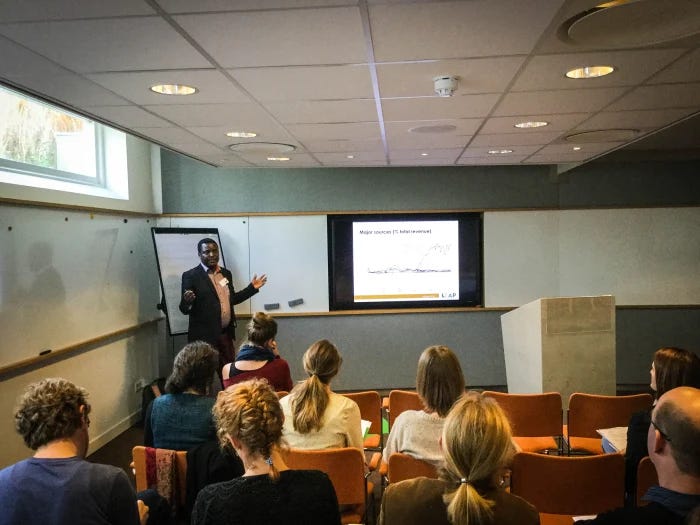It's the sixth AEHN meetings!
Stellenbosch PhD student Abel Gwaindepi presenting his research at last year's AEHN meetings
This week the University of Sussex hosts the sixth African Economic History Network meetings. I've just arrived in Brighton for what will be a full programme of conferencing on Friday and Saturday, and meetings and discussions in-between. Our hosts, Alex Moradi and Felix Meier zu Selhausen, have done a splendid job of attracting more than 60 high-quality papers from a wide spectrum of economists and historians working on the African past. The full programme is available here.
This is an important moment for the field. Having grown rapidly over the last few years as younger scholars (mostly from Europe) embrace the field of quantitative African economic history, the annual meeting now provides a platform for many of them to showcase their work. Their passion and enterprise have uncovered new data sources, which have challenged long-held beliefs about topics like precolonial inequality, the economic causes underpinning the Scramble for Africa, the effects of missionary education, fiscal regimes, and many more.
But this can only be a beginning. As debates about decolonising curricula within South African universities raise legitimate concerns about challenging a Eurocentric view of African development, the challenge for the Network and for the broader research community is to expand the pool of researchers using these new sources and methods. African economic history, as I've written before, is a wonderful tool to contextualise the often ahistorical and acontextual economic theories that are the bedrock of economics courses. And while these formal models are necessary to allow students to evaluate economic policies and communicate their findings to an international audience, their interpretations must be informed by local histories and conditions. That is what a quantitative African economic history can do.
To dismiss the immense contribution the new breed of African economic historians that will congregate in Sussex has made is senseless. These scholars have spent many years reading and researching the African past, digitising precious historical sources, analysing trends and interpreting the African past based on new empirical results. These efforts have often also been associated with significant financial resources, which have allowed many sources to remain in the public domain. They have also written textbooks that are downloadable for free to African students.
My hope is that more African scholars can become participants in and contributors to these debates. Funding remains an issue, but so too a demand from African students. It would be wonderful, for example, to see more Masters dissertations at South African universities on African economic history questions. This is not always the students' fault. As one of my own students recently reminded me, it is the responsibility of academic staff to instil in students an interest in the important and often difficult (and contentious) research questions of our time. What were the causes and consequences of slavery and colonialism in its many dimensions? Of colonial infrastructure and education? Of the IMF structural adjustment programmes and the debt cancellation and development aid? Of immigration and emigration? Of natural resources and sovereign wealth funds? Of genetically modified crops and robotics?
Hopefully the AEHN meetings at Sussex this week will pose some of these important and difficult questions. And when the seventh African Economic History Network meetings come around next year (in Stellenbosch), we will have a large pool of African students contributing answers – and new questions.


